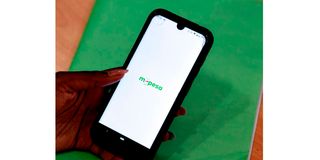Safaricom: Ruto’s Sh5,000 smartphone a pipe-dream with tax increase

A smartphone user on the MPesa App.
Telco giant, Safaricom has ruled out the possibility of assembling a Sh5,000 mobile phone locally with the proposed increase of import duty, excise duty and value added tax (VAT), dampening President William Ruto’s ambition for Kenya to manufacture the cheapest smartphone in Africa.
Safaricom said the proposed taxes will raise the cost of locally assembled smartphones to Sh11,500.
President Ruto last December announced that Kenya will manufacture the cheapest smartphone in Africa this year whose cost will be less than Sh5,000.
Dr Ruto promised to deliver the cheap smartphone within eight to 12 months of this year to ensure all Kenyans can access digital platforms for business and access to government services.
He told a forum of Micro, Small, and Medium Enterprises (MSMEs) representatives that the cheapest smart phone goes for between Sh10,000 and Sh15,000.
The telco on Tuesday told the National Assembly’s Finance and Planning committee to revise the rates of import duty, excise duty and Vat on cellular phones through the Finance Bill, 2023 to reduce the costs of locally assembled phones.
“If we were to work with the President's vision of a $50ollar phone, we need to address the question of import, excise and output Vat for me to save Sh4,000 and bring down the cost from Sh11, 500 to Sh7,500.” Karanja Gichiri, Safaricom Head of Venture, told MPs during public hearings on the Finance Bill.
“We can scale the taxes down to Sh3,000 where it will give the final price of locally assembled smart phone to between Sh6,500 to Sh7,000.”
A consortium of telecommunications operators and device manufactures wants the Finance committee to introduce changes to the Finance Bill, 2023 to charge Vat on locally assembled or manufactured mobile phones at zero percent.
The consortium told the committee chaired by Molo MP Kuria Kimani to amend the law to have excise duty exempted from the supply of locally assembled or manufactured phones.
“There has been a decline in imports by 13.5 percent due to shortage and inflation in the fourth quarter of 2022,” Job Kabochi, partners at PwC told MPs on behalf of the consortium.
“We propose that the Vat Act and the Excise Duty Act be amended to introduce a new paragraph within Part A of the Second Schedule of the VAT Act to include the supply of locally assembled and manufactured mobile phones and introduce a new paragraph to Part A of the Second Schedule of the Excise Duty Act to include disassembled/unassembled kits for local assembly or manufacture of mobile phones.”
Safaricom in its presentations to the committee said the reduction of taxes will see it assemble the most affordable phone in Africa.
Safaricom said it has a factory that will be launched soon to assemble between 1.2 million and 1.4 million smartphones per year.
“Today we have one local assembly line that recently started. It is estimated we import 4 million phones each year and it is a constraint on foreign currency requirements,” Mr Gachiri said.
Most expensive
“The most expensive part of the phone is the microchip that runs the 4G network within the phone. We have sourced and the appropriate base for a good phone is $40 driven by the chip and components.”
He said other drivers of cost are taxes of bringing the phones to the port of Mombasa arguing Safaricom spent an additional Sh2,300 for a Sh5, 0000 phone largely driven by import duty and excise duty.
“After that, the assembly of the phone will cost Sh300 including factory profit margins. We want to pass the cost benefit to the consumer,”
“But when you look at last mile connectivity, another Sh1,400 will be consumed and output Vat for the device isSh1,500. This brings the final price to Sh11,500 with the manufacturer taking only Sh300,” Mr Gachiri said.
He said when Dr Ruto announced the production of the Sh5,000 locally assembled smartphones, the exchange rate was about Sh118 to the dollar but this is now at Sh135.
“We estimate 120 million new subscribers in Africa will need phones and taking advantage of Africa Continental Free Trade Agreement (Acfta), we will be leaders in Africa and the world in mobile telephony,” Mr Gachiri said.





